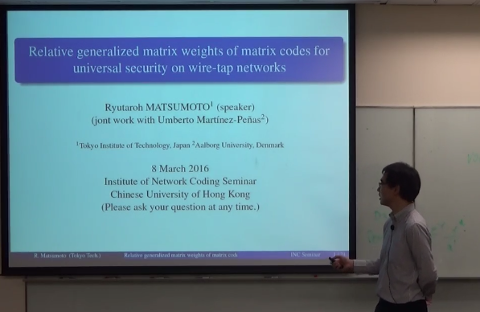
Universal security over a network with linear network coding has been intensively studied. However, previous linear codes and code pairs used for this purpose were linear over a larger field than that used on the network. In this work, we introduce new parameters (relative dimension/rank support profile and relative generalized matrix weights) for code pairs that are linear over the field used in the network, measuring the universal security performance of these code pairs. For one code and non-squarematrices, generalized matrix weights coincide with the existing Delsarte generalized weights, hence we prove the connection between these latter weights and secure network coding. The proposed new parameters enable us to add universal security to the recently proposed list-decodable rank-metric codes by Guruswami et al.
If we have sufficient time, we give several properties of the new parameters: monotonicity, Singleton-type lower and upper bounds, a duality theorem, and definitions and characterizations of equivalences and degenerateness of linear codes. Finally, we show that our parameters strictly extend relative dimension/length profile and relative generalized Hamming weights, respectively, and relative dimension/intersection profile and relative generalized rank weights, respectively. The duality theorems for generalized Hamming weights and generalized rank weights can be deduced as special cases of the duality theorem for generalized matrix weights.
This is a joint work with Umberto Martínez-Peñas.
Full version available at https//arxiv.org/abs/1612.01888
Ryutaroh Matsumoto was born in Nagoya, Japan, on November 29, 1973. He received the B.E. degree in computer science, the M.E. degree in information processing, and the Ph.D. degree in electrical and electronic engineering, all from Tokyo Institute of Technology, Japan, in 1996, 1998 and 2001, respectively. He was an Assistant Professor from 2001 to 2004, and has been an Associate Professor since 2004 in the Department of Information and Communications Engineering, Tokyo Institute of Technology. He also served as a Velux Visiting Professor at the Department of Mathematical Sciences, Aalborg University, Denmark, in 2011 and 2014. His research interests include error-correcting codes, quantum information theory, information theoretic security, and communication theory. Dr. Matsumoto received the Young Engineer Award from IEICE and the Ericsson Young Scientist Award from Ericsson Japan in 2001. He received the Best Paper Awards from IEICE in 2001, 2008, 2011 and 2014.
